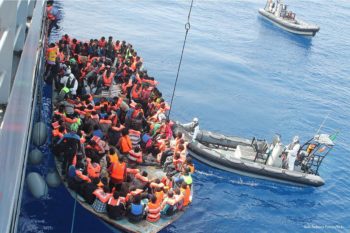
Aid group, Doctors Without Borders (MSF), has decried Italy’s shutting of its ports to humanitarian rescue ships.
MSF said this will trap more migrants in Libyan detention centres and in the hands of smugglers, where they face beatings and abuse.
A Doctors without Borders (MSF) mission leader in Libya, Cristophe Biteau, said everyone intercepted by the Libyan coastguard – about 10,789 people this year – ended up held indefinitely in centres run by the Tripoli government.
“With fewer rescue ships and the summer surge in departures, the situation in the centres will get worse and worse,” Biteau said.
Italy’s new far-right Interior Minister, Matteo Salvini, who took office on June 1, has said the rescue ships are no longer welcome on his shores, arguing that his government has already taken more than its fair share of migrants.
He has also questioned migrants’ reports of abuse in Libya – reports that are denied by Libyan authorities who have accused aid groups of encouraging migrants to make the dangerous crossing from North Africa to Europe through their well-publicised rescues.
Neither Salvini or Libyan authorities immediately responded to MSF’s comments on Friday.
MSF said between 5,000 and 7,000 people are held in seven official centres in Tripoli that are already overcrowded and unsanitary, with scabies and tuberculosis common.
There are 17 government detention facilities across all of Libya, and migrants and other aid groups have repeatedly described beatings and inhumane conditions.
Overall, about 700,000 migrants are estimated to be in Libya, the International Organization for Migration says. No one knows how many are imprisoned in secret camps run by people smugglers, where conditions are worse than in the official ones, MSF said.
“Our perception about people coming from Libya is that the violence is widespread,” Gianfranco De Maio, MSF’s global supervisor for its treatment of torture victims, told Reuters.
“All of the migrants being brought back end up in detention centres and the recent increase in the number of people being intercepted is putting increasing pressure on the already overcrowded facilities,” Roberto Mignone, the U.N. refugee agency’s representative in Libya, said on Friday.
Italy’s port closures to charity ships has also coincided with an increase in the death rate of migrants sea, though total arrivals from Libya have declined more than 85 this year from last.
From the start of June to July 2, 565 people, or 1 in 13 of those who set out from the Libyan coast, drowned or went missing, compared with 1 in 43 during the first five months of the year, said Matteo Villa, a research fellow for migration at Italy’s Institute for Studies on International Politics (ISPI), a think tank.
Agency Report